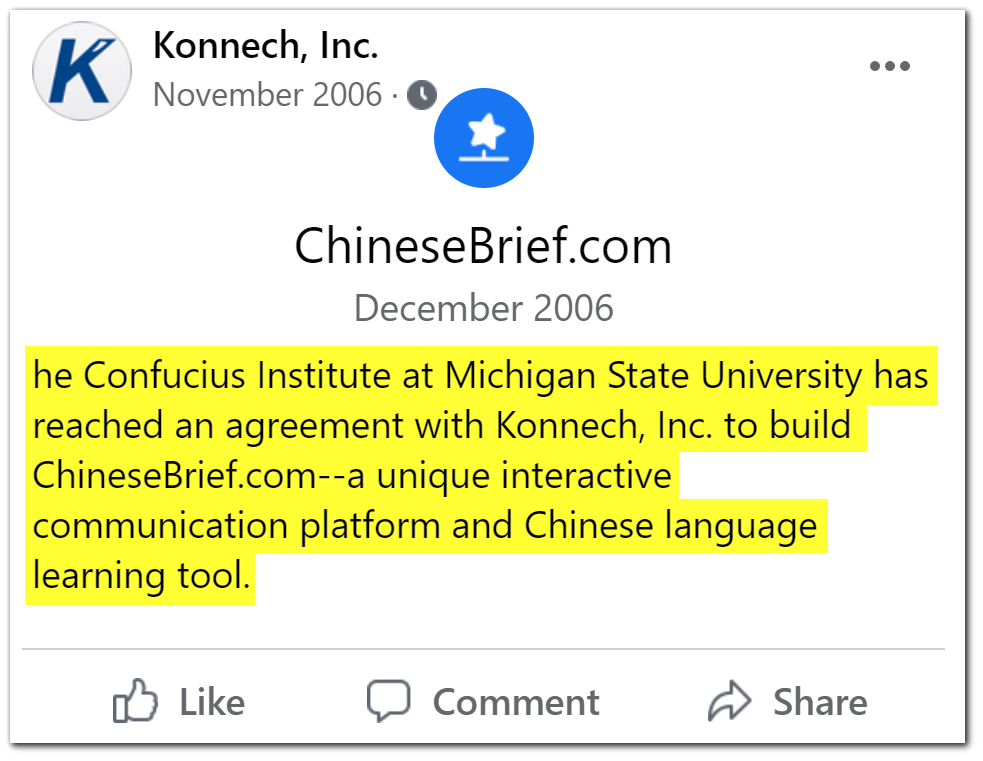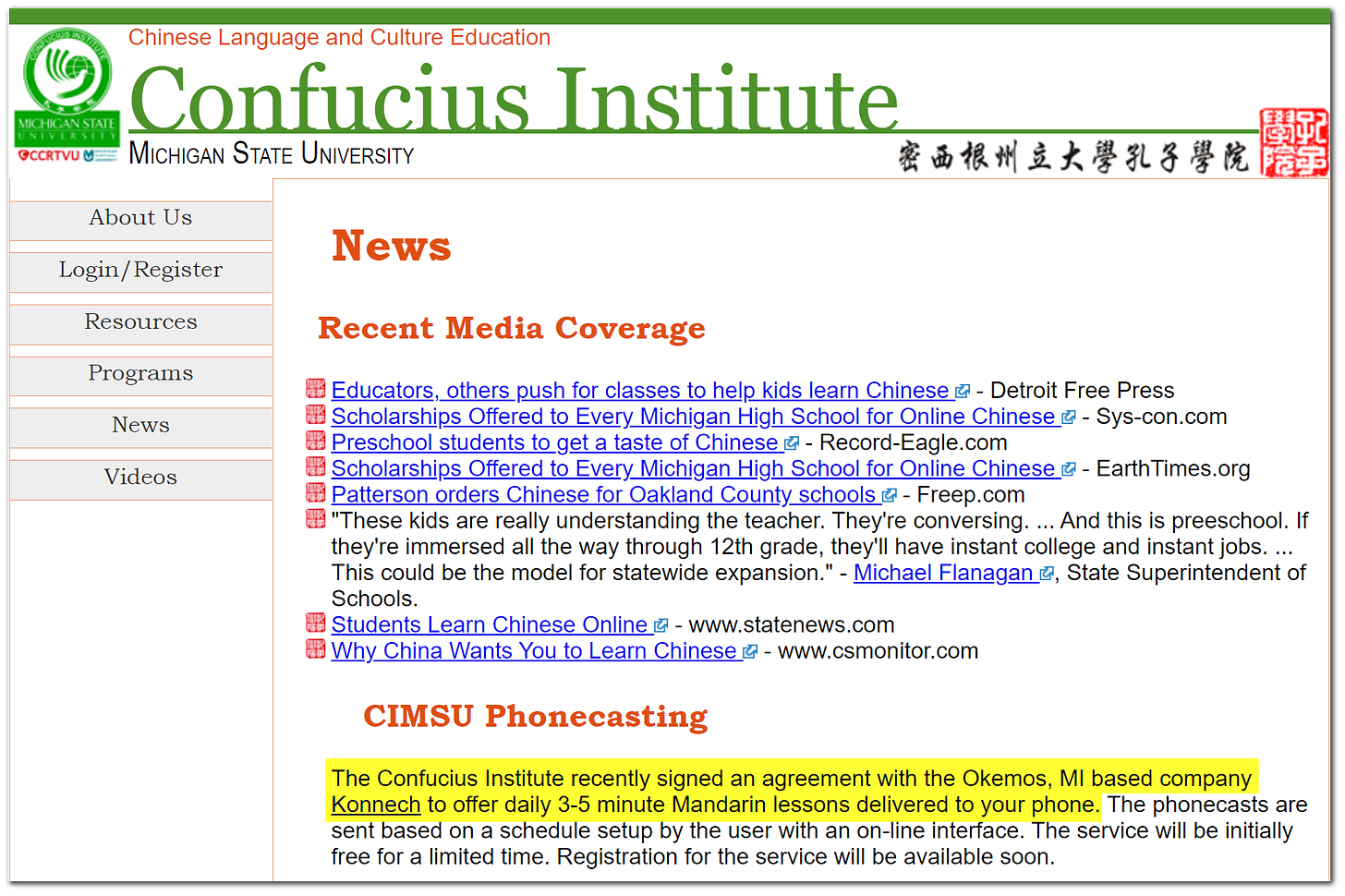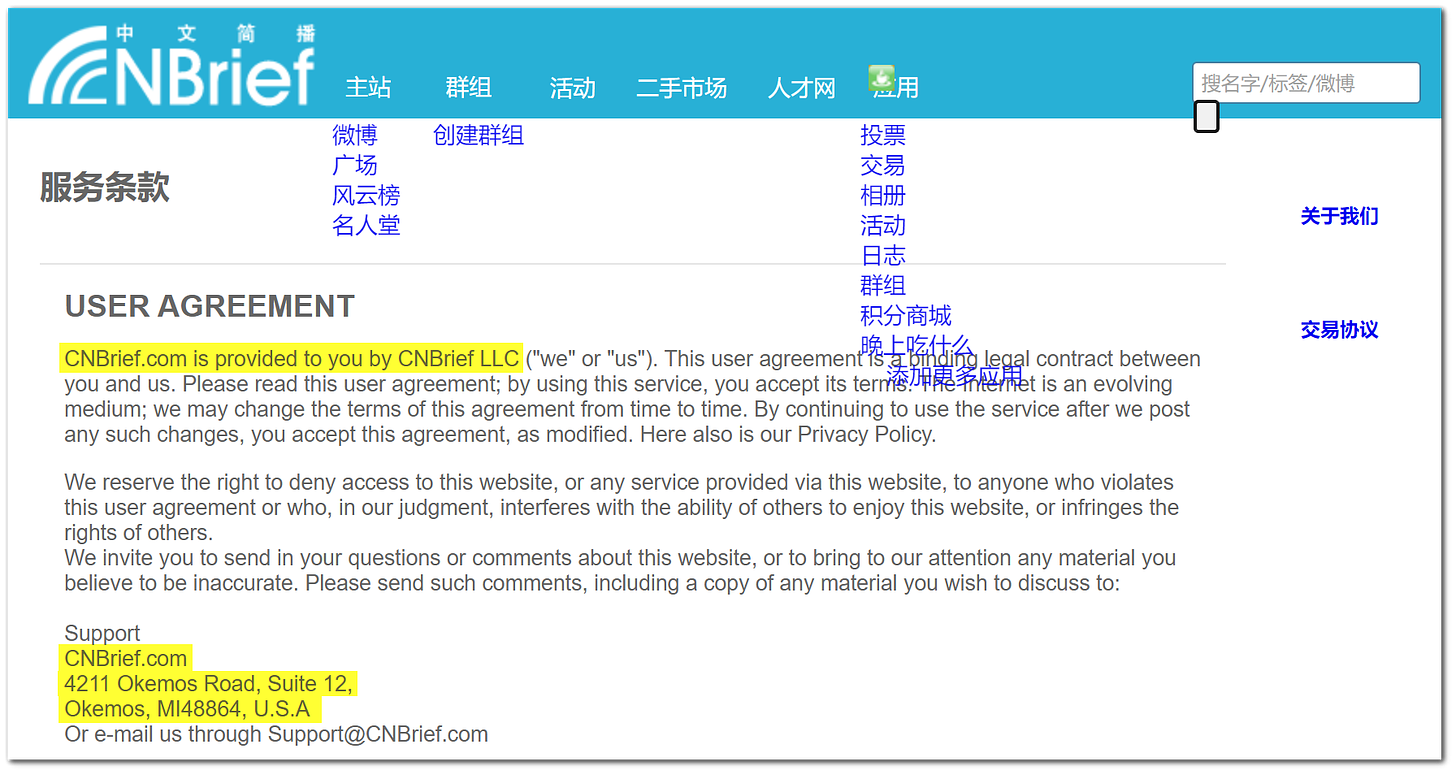Konnech’s rise from Jinhua Yulian Network to Hongzheng Technology begins on January 25, 2006, when CEO Eugene Yu was accepted into the Chinese Academy of Sciences Jinhua Science and Technology Park.

The Konnech story is much bigger than U.S. election software and best understood through the lens of China’s rise into a global superpower. Regardless of the actions of federal law enforcement or county prosecutors, many of the facts of this case are archived on deleted Chinese government websites, waiting to be uncovered by those who are willing to look. What is the truth about Konnech’s connection to China?
In 2019, the United States Senate released a report entitled Threats to the U.S. Research Enterprise: China’s Talent Recruitment Plans that explains how China’s more than 200 overseas talent recruitment plans—the most prominent of which is the Thousand Talents Plan—has contributed to China’s global rise over the last 20 years.
During that time, China openly recruited U.S.-based researchers, scientists, and entrepreneurs in the public and private sector to provide China with knowledge and intellectual capital in exchange for monetary gain and other benefits.
China provides salaries, research funding, office space, and other incentives to lure overseas talents into working for China. According to an analysis by the FBI, China invested more than $2 trillion between 2008 and 2020 into human resources as part of this “whole-of-government campaign to recruit talent and foreign experts from around the world.”
FBI – Chinese Talent Plans Encourage Trade Secret Theft, Economic Espionage
“Talent plans can sometimes foster legitimate sharing and collaboration as part of an appropriate business arrangement or research exchange, but this is not the norm. Instead, talent plans usually involve undisclosed and illegal transfers of information, technology, or intellectual property that are one-way and detrimental to U.S. institutions.”
An individual’s undisclosed participation in a talent plan may:
- “Pose risks to national security because of the participant’s obligation to the Chinese government”
- “Result in inappropriate use of taxpayer funds if the participant is awarded a U.S. government grant”
I will make three main arguments today.
First, the story of Konnech is the story of Jinhua Yulian Network and Jinhua Hongzheng Technology. While the New York Times confirmed the existence of Konnech’s Chinese subsidiary the day before Eugene Yu’s arrest, the U.S. media has been completely silent on the subject ever since. Why report on Eugene Yu’s arrest or his defamation case if you aren’t going to talk about his Chinese companies? These companies have large digital footprints, more employees than Konnech, and are the real story of Eugene Yu’s success.
Second, Eugene Yu was accepted into the Chinese Academy of Sciences Jinhua Science and Technology Park (“the Park”) on January 25, 2006. The Chinese Government has financed, developed, and ultimately controlled Jinhua Yulian Network ever since. Specifically, Eugene Yu is contractually obligated to follow the laws of the People’s Republic of China and the rules of the Park. In exchange, the Chinese government has provided Eugene Yu with money, software, and success beyond his wildest dreams.
Third, it is highly unlikely that Eugene Yu reported any of his foreign income to the U.S. government. For example, on July 18, 2007, Eugene Yu posted an ad on the Park’s website offering ¥ 5,000,000 yuan for help with developing “software packages.” Eugene Yu listed Jinhua Yulian Network’s URL as www.konnech.com, but do you think he told the U.S. government that Konnech’s software was being funded and developed at the Chinese Academy of Sciences Jinhua Science and Technology Park?
Let me now lay out the facts in greater detail starting in the order that I discovered them.
Chinese Brief – Overseas Chinese Network
In December 2006, Konnech wrote on a Facebook post “… Confucius Institute at Michigan State University has reached an agreement with Konnech, Inc. to build ChineseBrief.com—a unique interactive communication platform and Chinese language learning tool.”

Source: Konnech’s Facebook
Michigan State University’s Confucius Institute also announced this partnership on their now archived homepage, “The Confucius Institute recently signed an agreement with the Okemos, MI based company Konnech to offer daily 3-5 minute Mandarin lessons delivered to your phone.”

Source: Michigan State University Confucius Institute
Eugene Yu now says that he never finished developing this software, but that doesn’t change the fact that the Konnech “signed an agreement” to build ChineseBrief.com for the Confucius Institute.
Furthermore, Eugene Yu did later register a business named CNBrief LLC and build the now-deleted website www.cnbrief.com. The website’s copyright when translated from Chinese to English says “Chinese Brief – Overseas Chinese Network.”

Source: cnbrief.com
Nanjing University of Aeronautics and Astronautics
According to Linkedin, Konnech’s employees graduated from numerous Chinese universities including Zhejiang University, Nanjing University, University of Science and Technology of China, Beijing Language and Culture University, China Agricultural University, and Huazhong University of Science and Technology.
For example, Konnech software engineer Wang (Shawn) Xiang, graduated from Nanjing University of Aeronautics and Astronautics (NUAA) with a bachelors degree in Computer Science in 2012. In 2020, the United States banned NUAA graduate students from entering the country because of the University’s ties to the People’s Liberation Army (PLA).

Source: LinkedIn
Queensland Coders Locked Down In Wuhan
Queensland, Australia had problems with their “election reporting system” in 2020 after their “decision to acquire the Konnech system.”
Queensland government officials said Konnech’s software was not developed as planned because coding resources were locked down in Wuhan, China.
This led to Queensland Parliament Members asking—why Australian election software was being coded by Chinese coders?
After Eugene Yu’s arrest last month, MP Fiona Simpson repeated her concerns about Konnech’s Chinese coders to the Queensland Parliament and explained that, “Eugene Yu tried to sue me for raising issues about Konnech.”
“I believe these legal maneuvers by Mr. Yu are attempts to bully and gag an elected representative and our continued demand of greater transparency and accountability as well as security of our election system.”
China Association for Science and Technology (CAST)
Konnech’s CEO Eugene Yu is featured in a Chinese magazine entitled “Overseas Scholars” written by the China Association for Science and Technology in the United States (CAST-USA) and the American Zhu Kezhen Education Foundation (AZKEF).
CAST is a transnational organization and constituent member of the Chinese People’s Political Consultative Conference (CPPCC) whose stated mission is to “maintain close ties with millions of Chinese scientists, engineers and other people working in the fields of science and technology,” and to operate as “the bridge linking Chinese science and technology community with the Communist Party of China and the Chinese government,” according to organization’s archived “About Us” webpage.
In 2003, CAST established the Help Our Motherland through Elite Intellectual Resources from Overseas Program (HOME) in concert with the Organization Department of the Chinese Communist Party with the goal of recruiting overseas science and technology talent for the purpose of transferring technology and intellectual property back to China.
The CPPCC’s role in channeling overseas science and technology knowledge toward China’s development has grown since a 2013 directive from General Secretary Xi Jinping to focus on incentivizing overseas Chinese to contribute their technical skills and expertise to China’s national rejuvenation.
By 2020, a United States congressional body warned that the Chinese government has built a “sprawling ecosystem of structures, programs, and incentives to coopt and exploit overseas experts for the science and technology they acquire abroad.”
“Chinese leaders have long viewed advanced science and technology (S&T) as key to China’s comprehensive national power and sought to acquire it through licit and illicit means from developed countries like the United States,” the US-China Economic and Security Review Commission (USCC) said in the report.
“This ecosystem sponsors promising Chinese students and scholars at U.S. and other foreign universities, incentivizes their return to China for the long term, and employs transnational organizations to channel S&T know-how from those remaining abroad back to mainland China.”
The U.S. Senate report continues:
“Many programs associated with Beijing’s S&T transfer ecosystem—including scholarships to study abroad, talent recruitment plans, and entrepreneurship parks—contribute to China’s military-civil fusion strategy by collecting specific technologies and know-how that improve the capabilities of the People’s Liberation Army (PLA) and advance the goals” of the Chinese Communist Party (CCP).”
“This ecosystem sponsors promising Chinese students and scholars to study at foreign universities, incentivizes or requires their return to China in exchange for this support, and recruits researchers via hundreds of talent programs. Moreover, it integrates Chinese students and scholars remaining abroad with organizations that facilitate the transfer of S&T back to the Mainland, where it can be exploited by the PLA, government ministries, state-owned enterprises (SOEs), state-run laboratories, and startups.”
“Even when overseas Chinese students and scholars do stay in the United States after graduation, China’s transnational technology transfer organizations and talent recruitment plans provide a means to contribute to China’s national rejuvenation by transferring technology and know-how without requiring physical return.”
China’s Military-Civil Fusion Strategy
CAST which “maintains at least 12 chapters and about 8,000 members located across the United States” is a part of China’s military-civil fusion strategy, a plan which intentionally blurs the lines between public and private enterprises, to ensure that the nation’s military, espionage, and commercial interests are intertwined.
“CAST contributes to China’s overseas technology acquisition efforts chiefly through the “Haizhi Plan,” a sprawling program that conducts a plethora of outreach initiatives to overseas Chinese students and scholars,” the report continues.
“For the first ten years of its existence, the Haizhi Plan engaged in many of the activities typically associated with talent programs, such as sponsoring short-term trips to China, maintaining lists of prominent overseas Chinese students and scholars regarded as experts in their scientific field, organizing recruitment events, sponsoring startup competitions, offering incentives to entrepreneurs to return to China, and enabling scientific cooperation projects between overseas and domestic institutions.”

Source: China Association of Science and Technology in the United States
AZKEF Flies Charles Lieber To China
In the magazine, CAST-USA refers to Eugene Yu by his Chinese name Yu Jianwei (于建伟) and says that he is an “officer” on the “finance committee” of the American Zhu Kezhen Education Foundation. The foundation’s stated mission is “to promote exchange and cooperation between Zhejiang University and universities in the United States,” and “to invite United States professors or scientists to Zhejiang University.”
In 2002, AZKEF flew Professor Charles Lieber, the head of Harvard’s Chemistry Department, to Zhejiang University to give a speech on “Nanotech in Today’s World.”
According to AZKEF, Prof. Charles Lieber’s visit “produced a lot of excitement” and other universities such as the “Chinese Academy of Sciences” also invited Lieber to visit their campuses:
The 2002 lecturer, Prof. Charles Lieber, the Mark Hyman Professor of Chemistry of Harvard University is a recognized foremost scientist in nano science and technology, an emerging field of intense worldwide interest. The announcement of his visit to ZU instantly produced a lot of excitement in scientific circles in China. Fudan University, University of Science and Technology of China, Tshinghua University, and the Chinese Academy of Sciences took this advantage to invite Prof. Lieber to also visit their campuses.
Prof. Lieber’s lectures at ZU attracted a large audience. He received an honorary professorship from ZU and provided valuable feedback to ZU’s Center for Nano Science and Technology after hearing presentations by five ZU professors in this area. Prof. Lieber truly found this trip interesting and enjoyable, and stated that it was the best trip he has taken in many, many years.
In 2020, Prof. Charles Lieber was arrested for concealing his funding from the Wuhan University of Technology and his participation in China’s Thousand Talents Program.
At a Senate Judiciary Committee hearing, Bill Priestap, the former Assistant Director of the FBI’s Counterintelligence Division, stated that China’s talent recruitment plans are effectively “brain gain programs” that “encourage theft of intellectual property from U.S. institutions.”
Priestap continued, “For example, China’s talent recruitment plans, such as the Thousand Talents Program, offer competitive salaries, state-of-the-art research facilities, and honorific titles, luring both Chinese overseas talent and foreign experts alike to bring their knowledge and experience to China, even if that means stealing proprietary information or violating export controls to do so.”
Eugene Yu was an “officer” on the “finance committee” of a Chinese foundation in the United States tasked with flying professors like Charles Lieber to China and this discovery was made on a China Association for Science and Technology in the United States magazine entitled “Overseas Scholars.”
In a similar fashion to how the U.S. congressional report described CAST’s overseas science and technology acquisition efforts, AZKEF keeps list of talented overseas Chinese students, offers incentives for prominent scientists to fly to China, and focuses on bridging Zhejiang University with universities in the United States.
Source – https://kanekoa.substack.com/p/how-the-chinese-academy-of-sciences
